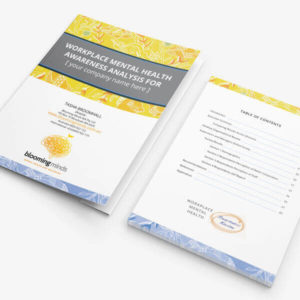Nowadays we hear a lot about mental health and wellbeing in the workplace, often relating to the costs associated with mental health issues. But what is the cost of ignoring workplace mental health?
Cost of Ignoring Mental Health At Work
What many organisations fail to capitalise on is that rather than waiting for mental disorders to have negative impacts in their workplace, they can benefit from deliberate action to proactively look after their employees’ mental health and wellbeing. Unfortunately, many organisations choose to wait until things are broken and then scramble to fix them.
Preventative strategies
Using ongoing preventative strategies to look after their employees’ mental health and wellbeing provides an opportunity for employees to be, and stay, mentally healthy. Mental wellbeing is an active process.
This is not to say that an employee’s mental wellbeing is the responsibility of the employer. But given that there is very strong evidence that happy and healthy employees are good for business profitability, and that unwell employees can serve to drain resources and reduce profitability and productivity, it makes good business sense to have a proactive approach to employee mental health and wellbeing.
Rising workers’ compensation claims
Work related mental stress Workers’ Compensation claims have doubled in recent years. They are the most expensive form of Workers’ Compensation claim because they usually involve lengthy periods of absence.
Serious impact
Poor psychological and physical health is having a serious impact on worker wellbeing and productivity, which results in increased costs to employers. Research indicates that job stressors such as an ‘unhealthy’ workplace, work overload, or a traumatic work incident can contribute to the development of mental disorders, or exacerbate already existing mental health issues.
As well as the costs, the law requires that organisations provide reasonable adjustments for employees with mental health issues and that employers do not discriminate against an employee on the grounds of mental disorders or disability.
Employers are legally obliged to:
- Not discriminate against an employee with mental health issues: Disability discrimination legislation requires you to ensure your workplace does not discriminate against or harass workers with mental disorders (either directly or indirectly). This extends to making reasonable adjustments to meet the needs of such workers.
- Ensure health and safety: OHS legislation requires you to ensure your workplace is safe and healthy for all workers and does not cause ill health or aggravate existing conditions. See our Workplace Psychosocial Safety & Wellbeing Policy and Support Pack
- Ensure privacy: Privacy legislation requires you to ensure personal information about a worker’s mental health status is not disclosed to anyone without the worker’s consent.
- Avoid adverse actions: You are also required under Commonwealth industrial law to ensure your workplace does not take any adverse action against a worker because of their mental disorder.
Currently
Despite one in five adults experiencing mental health problems each year, nearly half of all senior managers believe none of their workers will experience a mental health problem in the workplace.
This was highlighted to me a few years ago when I was speaking with a senior manager of a multi-national company who wanted to know what could be done to get rid of employees living with mental health issues, or even better, how could he screen prospective employees to make sure he didn’t hire someone in the first place.
Far better to develop a strategy
Given the numbers, sticking our heads in the sand does not make good business sense. Mental health issues are real and relevant in the workplace. It is far better to develop a strategy to minimise the impacts and costs – both human and economic. A good first step is a mental health awareness analysis for your organisation.
Extract from a previous edition of Blooming Minds eMag. Read the full article here
Tap into our mental health expertise
Image: Mario Gogh (Unsplash)



